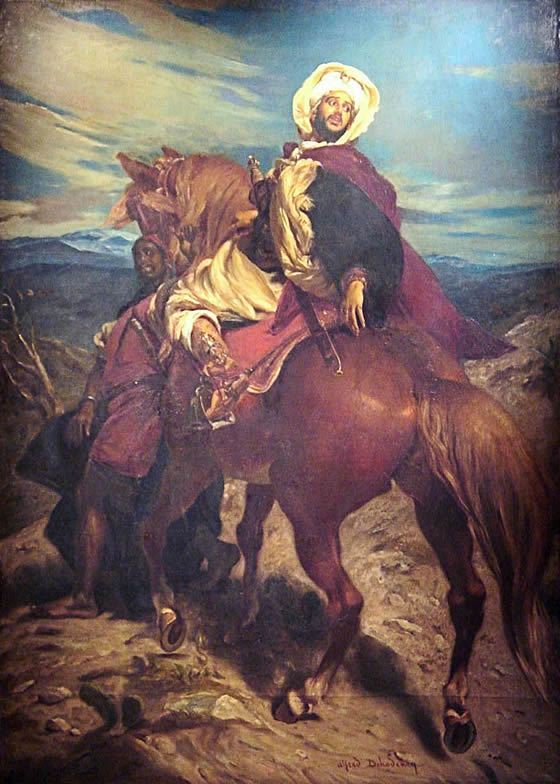Boabdil, who ruled as Muhammad XII (reigned 1482–83, 1487–92), was the last Muslim Nasrid ruler in Granada, Spain, during the final stages of the Reconquest of Spain, or Reconquista. For several centuries the Muslim dynasties in the Iberian Peninsula had lost territory to the Christian Portuguese and Spanish forces. The Almohads (a Berber dynasty from Morocco) lost Cordoba in 1236 and Seville in 1248.
The Almohads, strict unitarians, followed the teachings of Ibn Tumert (d. 1130), an extremely conservative religious leader who even condemned all four schools of Islamic law. The far more liberal land and pleasure seeking Muslim population in the Iberian Peninsula rejected the Amohad brand of extreme puritanism and support in wartime.
The Muslim city-states were also weakened by internal dynastic divisions and competition among themselves. Granada was left as the last Muslim stronghold; after the Christians took Gibraltar in 1462, Granada was cut off from ports and reinforcements from North Africa.
  |
During the first years of his reign, Boabdil was taken prisoner by the Christians and was forced to become a vassal of Castile as a price for his release. He then disputed with his brother, who had styled himself Muhammad XII, before regaining the throne in 1487.
But his victory was short lived, for in 1491, the forces of Ferdinand V and Isabella I of Spain lay siege to the city. The defeat of Granada was a foregone conclusion and in January 1492 (on the day of Epiphany), Boabdil handed over the key to the city. He was forced into a temporary exile at Alpujarras.
As he reached the ridge overlooking the city, he looked back and sighed. Boabdil’s mother, A’isha, then supposedly taunted her son that he “wept like a woman for what he could not hold as a man.” A stone marker to the “Moor’s sighs” still commemorates the spot.
 |
| Sultan Boabdil surrender to Ferdinand and Isabella |
Ferdinand and Isabella, devout Catholics, and their successors moved to erase evidence of the long Muslim control over the territory and to establish a Christian society. In reaction some remaining Muslims, known as Mudejars, rose up in a futile revolt that was brutally quashed in 1570. Others, known as Moriscos, converted to Christianity.
The majority, including Boabdil, fled to Morocco and other parts of North Africa. For Christendom, the victory over Granada compensated in some measure for the earlier loss of the Byzantine Greek Catholic capital of Constantinople to the Ottoman Turks in 1453. From the Islamic perspective, the loss of Granada and all of Andalusia was a major defeat.
